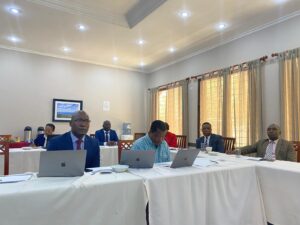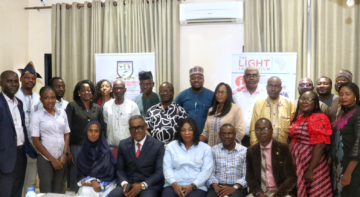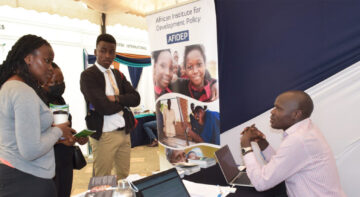Blogs

Tuberculosis (TB) is estimated to have contributed to 1.7 million deaths globally, with 417,000 deaths from the African continent (as of 2016). It was the leading infectious cause of death worldwide before COVID-19. However, the burden of other acute and chronic respiratory conditions has been rising. While notable effort is being made to deal with TB, more needs to be done to encompass the wider range of Chronic Lung Diseases (CLDs) if lung health is to be adequately addressed.
Although progress has been made in recent decades to address lung health issues in Africa, gaps are still evident. To drive the TB and lung health agenda at regional level, the African Institute for Development (AFIDEP) on 27 October 2021 joined policymakers and partners at a preliminary meeting of the Network of African Parliamentary Committees of Health (NEAPACOH). The main NEAPACOH meeting took place on 28 and 29 October.
The preliminary meeting on TB and Lung Health was jointly facilitated by the NEAPACOH secretariat and experts from the International Multidisciplinary Programme to Address Lung Health and TB in Africa (IMPALA), led by AFIDEP. The IMPALA programme aims to strengthen research and health systems capacity to address interconnected CLDs in Africa. The meeting was a follow up to a preliminary meeting at the 2020 NEAPACOH meeting where experts from IMPALA initially presented emerging evidence on TB and Lung Health in Africa to parliamentarians, and how the issues could be addressed in their countries.
This year’s TB and Lung Health session, moderated by AFIDEP’s Executive Director, Dr Eliya Zulu aimed to reiterate previously shared evidence on TB and other CLDs, as well as provide new evidence to the policymakers and other participants. The end goal was to further explore how IMPALA can support health committees to champion programmes and policy interventions to reduce the high burden of TB and Lung Health in their respective countries and regionally.
Dr Zulu in his opening remarks expressed his excitement to be a part of NEAPACOH, stating that, “[AFIDEP] is very excited to once again be at NEAPACOH. We appreciate the partnership we have with Partners in Population and Development…as we have been doing this for over ten years, I am really glad that we are having our annual meeting today.”

AFIDEP’s Executive Director, Dr. Eliya Zulu, attending the NEAPACOH conference in 2020.
The introductory session, led by Dr Angela Obasi, a senior clinical lecturer at the Liverpool School of Tropical Medicine (LSTM), focused on giving an overview of TB and CLDs and why both must be made health programming and policy priorities in Africa. She emphasised that while TB is serious and adversely affects the lives of those it infects, TB is only a part of the story where lung health is concerned. Other CLDs that are not infectious, such as Asthma and Chronic Obstructive Pulmonary Disease, contribute to three times more deaths than TB—and yet have been neglected. Dr Obasi further highlighted that COVID-19 is also a disease of the lungs, and has challenged existing lung health infrastructure.
Dr Brenda Mungai, a PhD candidate at LSTM presented findings from the Kenya National Survey, including discussions on Post-TB Lung Disease (PTLD). She shared that chest x-rays often used when national TB programmes are implementing active case finding activities to identify new cases of TB are potentially/can be a missed opportunity to identify other CLDs. She called on African countries to be aware of other treatable and preventable lung and heart diseases as they conduct chest screenings, as these can be as or more prevalent than TB and require early detection.
In her discussion, Dr Mungai further reminded participants that while many do recover from TB, there exists a population that never does—a condition referred to as PTLD. Some lungs become very damaged and never revert to the way they previously functioned. She, therefore, urged policymakers and other stakeholders to treat PTLD as a condition that needs to be at the forefront of healthcare in Africa; and for more resources to be allocated to post-TB care.
The pre-meeting’s final presenter, Dr Uzochukwo Egere, Postdoctoral researcher at LSTM presented an examination of the readiness of health systems to provide services for CLDs, as well as the socio-economic impacts on patients and their families. This was based on findings from studies conducted in Kenya, Sudan and Tanzania. The study found that there is low prioritisation of CLDs in Africa, and strained human resources and guidelines, relevant equipment, and essential medicines are also lacking. Due to all these lapses, clinicians are unable to adequately manage CLDs.
Dr. Egere noted that Sub-Saharan Africa (SSA) will continue to face increased burden, mortality and morbidity as a result of CLDs. “We need to have adequately prepared health systems to deliver quality care for all patients with CLDs and not just those with TB, as Sub-Saharan Africa (SSA) will continue to face increased burden, mortality and morbidity from CLDs. We should also be able to address the huge socio-economic impacts,” he said.
Dr. Egere also highlighted the need to address the huge socio-economic impacts of CLDs. Patients with CLDs are subjected to stigma in the community which also affects their means of providing for themselves and their families. This coupled with the factors mentioned before show that health systems in African countries are not ready to treat the neglected CLDs. CLDs, therefore, need to be given much more attention, as well as be included in the development of patient-centred non-communicable disease programmes for chronic health.
Dr. Zulu, in his closing remarks, underscored the readiness of the IMPALA programme to support the parliamentary committees that are interested in pursuing and moving the TB and lung health agenda forward, beyond the meeting.
Following the pre-meeting, Dr Zulu also had the privilege of highlighting key messages and implications from the session presentations to the parliamentarians in attendance on the last day of the main NEAPACOH meeting. Dr Zulu further emphasised the availability of support from AFIDEP through the IMPALA programme, with one way being to package and avail evidence that would help parliamentarians with advocacy for TB and lung health issues in their countiries.
Related Posts





